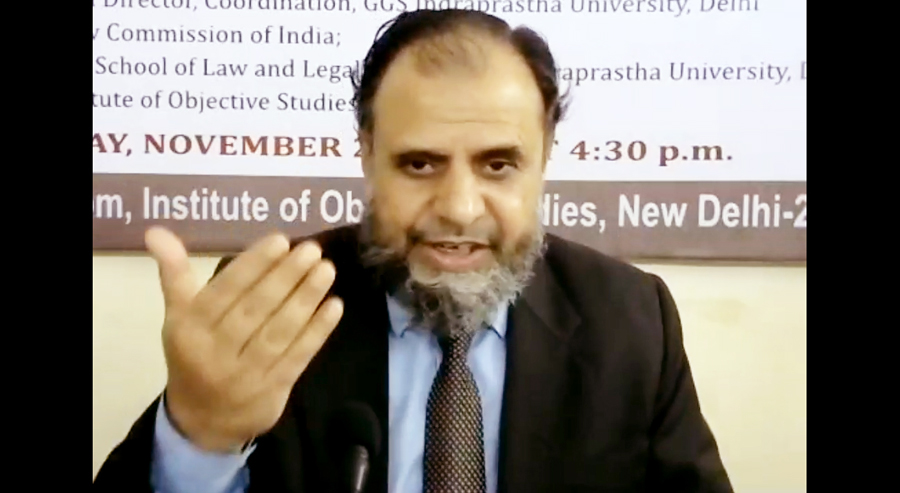IOS On-line Lecture based on review of ‘The Cultural Atlas of Islam’

New Delhi: An on-line lecture on understanding the purpose of law based on Prof. Raji al-Faruqi and Lamaya al-Faruqi’s book ‘The Cultural Atlas of Islam’ (Part-4, Chapter-14: The Law) was organised by the Institute of Objective Studies, here on November 26, 2020 that also happened to be the Law Day. Prof. M Afzal Wani, professor of law and director, co-ordination, GGS Indraprastha University and vice-chairman, IOS, who delivered the lecture, held that the Creator was the source of knowledge and the man had been tasked with the actualisation of His Will.
It should be understood in terms of the command of the Creator. Actualisation with reference to the Will meant subordination and subjugation to God. Explaining actualisation, he said that it meant actualisation of dignity, adding that the Divine should not be subjected to indignity. It should be in relation to the Creator. This established a relationship between the Creator and the creation. He observed that all human legislations stemmed from this relationship.
Prof. Wani pointed out that when one looked to the Creator, one came to the Shariah, meaning realism. When Allah gave man command, He gave man the capacity or ability to follow His Will. Allah had given sufficient life to the human being to realise it. He gave revelation to man through the Prophet (PBUH) for the sake of actualisation of His Will. A human being was supposed to look to and understand revelation. He had been invested with the power of communication which should not be in self-interest alone. The Almighty had given human beings support. God had given them the potential, capacity and ability to actualise His Will. Thus it was incumbent on the human being to utilize and enjoy that capacity. As said in the Quran, man had been made ashraful makhlooqat (superior to other creatures), he must look to the noble law. Since the Creator had given the man divine pleasure, he must make laws to maximise pleasure for others. Here lay the sense of realisation of responsibility by man. He had made the human body to enjoy pleasure, Prof. Wani said.
Prof. Wani observed that the Almighty had given humans the ability to do things. But it was up to humans to decide how to use that ability, right or wrong way. One was born with a capacity and had also been given a responsibility towards the society to fulfill it. God expected man to do justice. He said that justice was absolute and a human being was commanded not to violate it. Everybody had a quality that could be put into plenty. It was due to the will of the Creator that one did a lot of things. Human existence was not an illusion and it was the duty of human beings to actualise the Will of the Creator.
Prof. Wani, said that it was within the human capacity to learn about the Will of Allah. This was possible because man did possess some knowledge and capacity to understand. People believed in revelation because that was unique. But there was contradiction among men to understand the same in different ways. In this connection, he cited the example of triple talaq, which brought Muslim to the question of dignity of women. In favour of actualisation, arguments could be advanced. This depended on how one used his intelligence, he concluded.
Go Back